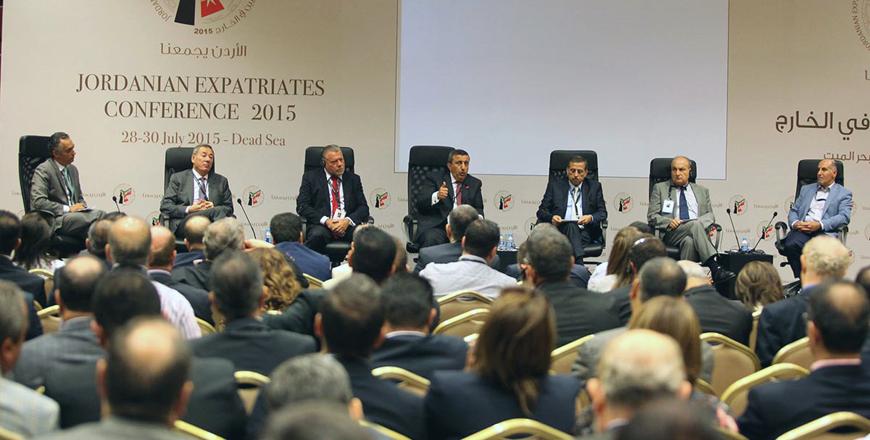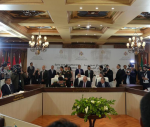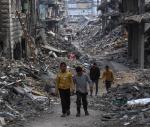You are here
Expatriates urged to invest in Kingdom’s healthcare, renewable energy sectors
By Dana Al Emam - Jul 29,2015 - Last updated at Jul 29,2015

Investors and government officials participate in a session held within the Jordanian Expatriates Conference 2015 at the Dead Sea on Wednesday (Petra photo)
DEAD SEA — Jordanian expatriates should invest in promising fields in their homeland, including services, healthcare and renewable energy, to further accelerate social and economic development, officials and investors said Wednesday.
In a session discussing investment opportunities at the Jordanian Expatriates Conference 2015, local and international investors in several fields in the Kingdom shared their experiences with expatriates, citing “real” government efforts towards reducing bureaucracy.
Commenting on facilitations offered to investors, Jordan Investment Commission (JIC) President Montaser Oqlah said the new Investment Law has granted “unprecedented” authority to the commission as a single destination to deal with all investment issues.
The recently passed law lists the industry, agriculture, health, tourism, hospitals, electricity generation and distribution, as well as railway transportation and aviation as priority sectors, in which investments can benefit from incentives in terms of income and sales taxes, and customs duties.
Oqlah cited several projects in the mentioned fields that have achieved “very high revenues”, adding that JIC encourages investors to benefit from its investment plans for projects in southern and northern governorates.
Representing an investment that improved the international ranking of Queen Alia International Airport (QAIA) from 186 to 40 in less than two years, Kjeld Binger, CEO of the Airport International Group (AIG) — the consortium responsible for the rehabilitation, expansion and operation of QAIA — said investing in Jordan is “the thing to do”.
Since AIG signed an investment contract with the government in 2007, with an overall cost reaching $1 billion in two phases, the group has witnessed a remarkable improvement in the way government agencies treat investors, according to Binger.
He cited Jordan as an “extremely stable” country, security-wise, adding that political and legislative stability also contribute to creating an investment-friendly environment.
Jean-Claude Tourret, head of the Agency for Sustainable Mediterranean cities and territories — a French body that works with the Aqaba Special Economic Zone Authority on cooperation in the field of sustainable urban and territorial development — agreed with Binger.
He added that Jordan has become a leading destination for investments in the region, adding that France is the top non-Arab investor in Jordan, citing political stability and the geostrategic positioning of Aqaba between Europe and Asia as key investment attraction factors.
As an investor and the president of the Amman Chamber of Commerce (ACC), Issa Murad urged prospective investors among Jordanian expatriates not to give ear to “exaggerated” talk about regulations governing investments in Jordan, adding that there is always room for legislative amendments.
“Jordan’s economic security, as well as its firm judiciary and banking systems, protect the rights of investors,” he said, adding that the unified investment window has a big role in solving problems facing investors, including eliminating unnecessary procedures.
As instability in most of Jordan’s neighbouring countries has caused border closures, the ACC has intensified its efforts to find new markets for Jordanian products, said Murad, who added that Jordanians, especially those living in Europe, can invest in import and export projects.
“Jordan imports around 20 per cent of its goods from Europe, while our exports to them do not exceed 3 per cent,” he said, urging investors to study the market well in order to avoid unnecessary repetition of projects.
With a value of JD270 million, investments in the private hospital sector constituted 23.6 per cent of the overall number of investment projects that benefited from JIC incentives in 2014, according to Private Hospitals Association President Fawzi Hammouri, who also noted that 60 per cent of hospitals in Jordan are privately owned.
In the same year, 250,000 patients visited the Kingdom for healthcare purposes, with two escorts accompanying each patient, increasing the number to 750,000 visitors, he said, adding that Jordan is a “very reputable” healthcare hub that was recently ranked the first medical tourism destination in the region.
In Jordan, which has the second highest worldwide doctor to citizen ratio after the United States — with 28 doctors for every 10,000 Jordanians, private hospitals have received some 120,000 Libyan and 50,000 Syrian patients as a result of the recent uprisings, according to Hammouri.
“Thousands of Yemenis contacted Jordanian private hospitals to arrange for medical treatment,” he said, adding that the “reasonable prices” of healthcare services in Jordan make the Kingdom a preferred destination for Saudis, who account for the highest number of non-Jordanian patients in the Kingdom.
As a country that imports 96 per cent of its energy needs, Jordan spent up to 18 per cent of the gross domestic product on energy in 2014, said Maher Matalka, chairman of EDAMA, a Jordanian business association that seeks innovative solutions for energy and water independence.
He highlighted investment opportunities in the field of renewable energy as the situation calls for further diversification of energy resources, citing several major solar and wind energy projects in Maan and Mafraq that are expected to employ thousands of Jordanians.
Related Articles
Jordan Investment Commission (JIC) President Montaser Oqlah on Monday acquainted Li Jianhua, Ningxia committee secretary at the Communist Party of China, with the economic reforms that Jordan has achieved.
YINCHUAN, China – President of the Jordan Investment Commission (JIC) Montaser Oqlah on Saturday urged Chinese businesspeople to change thei
AMMAN — Chairman of the Jordan Investment Commission (JIC) Khalid Wazani on Monday said that the commission will adopt a plan for “all promi
















